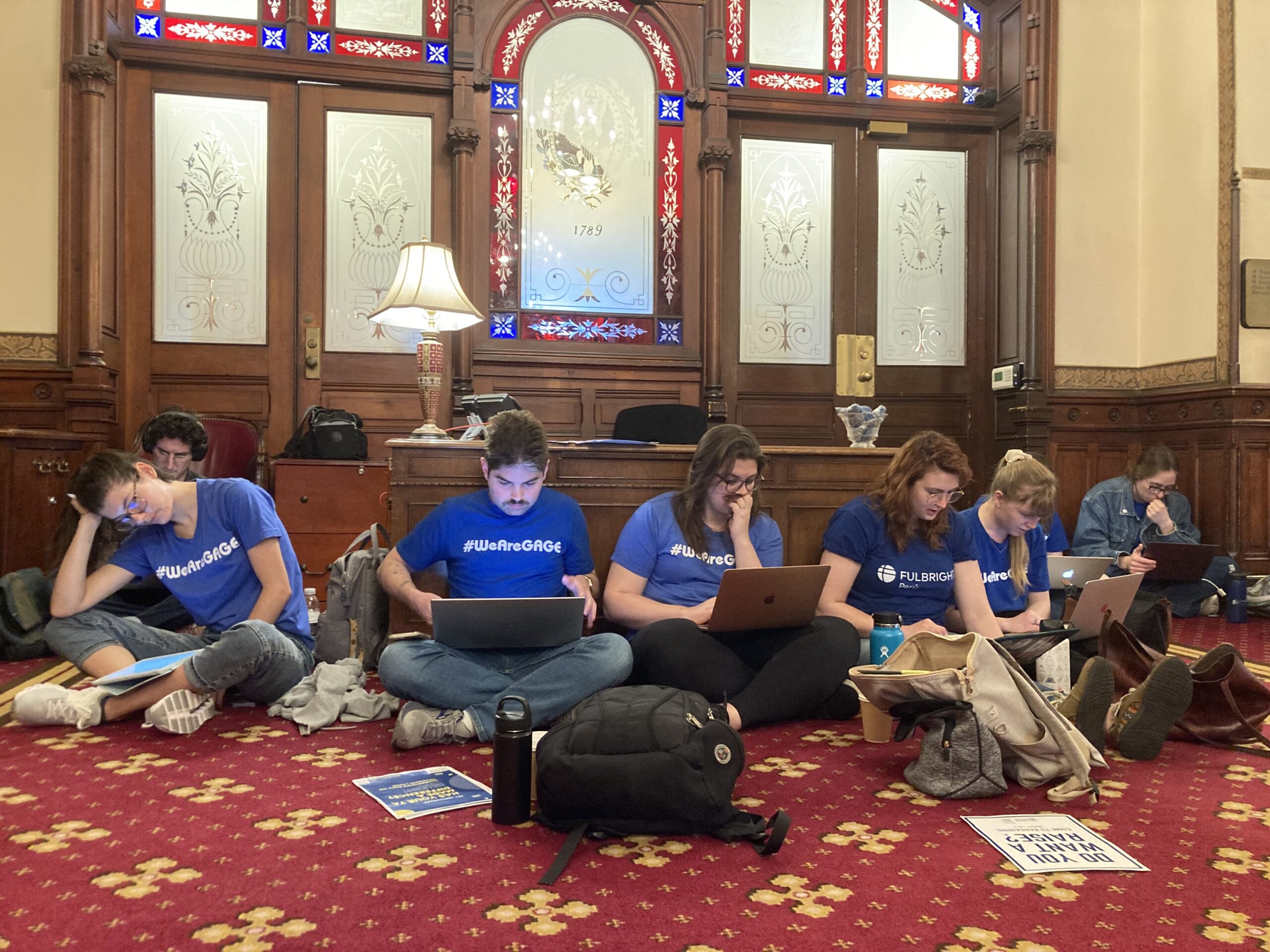For Emma Lederer, a second-year PhD student in the Biology Department, a living wage salary from Georgetown University would mean not only more time to work on her dissertation, but also a respite from financial woes.
“It would mean not having to worry about medical bills so much. I have to see a doctor once a month to keep up with my medications,” Lederer said. “My prescription costs change pretty exorbitantly. It would mean a lack of stress on me.”
It would also mean saving for future expenses. “One day I want to buy a house. I’m not saving any money. I’m breaking even each month,” she added.
In addition to her PhD research, Lederer also teaches undergraduates at Georgetown. But despite the additional work, her 12-month PhD stipend from Georgetown is only $36,934—not enough to pay her medical bills, nor enough to get by in D.C., where the cost of living is 53 percent higher than the national average.
To afford the skyrocketing cost of rent in the District, 73 percent of graduate student workers spend more than half their income on rent. Thirty-six percent have skipped meals to make ends meet. Nearly 82 percent of graduate student workers report that their compensation does not meet their financial needs. (provigil)
The Georgetown Alliance of Graduate Employees (GAGE), which represents the over 1,000 graduate workers at Georgetown, aims to secure better compensation for graduate students in ongoing contract negotiations with the university. Among other changes, GAGE has proposed an increase in the nine-month PhD stipend to $45,802 and hourly pay based on the MIT living wage calculator and comparable pay at other prestigious universities like Brown, Cornell, Princeton, and Harvard.
Negotiations have been ongoing since Oct. 14, but the bargaining team has been meeting for nearly a year to compile student demands. The negotiations build on the contract agreement from three years prior, which was the first of its kind at Georgetown and established new health benefits, Counseling and Psychiatric Services (CAPS) reform, and protections for survivors of sexual assault. The fight for a living wage—the previous contract settled on $32,500 for nine-month stipends, below what GAGE demanded—continues.
“GAGE was bargaining for a living wage last time, and we’re bargaining for a living wage now,” Dominic Cooper, a PhD candidate in the Philosophy Department and president of GAGE, said. “Now, more than I can remember, people are hurting.”
The two groups have been able to come to tentative agreement on some demands, including a timeline for filling out immigration forms within four weeks, frequent updates of the bargaining unit list, and informing new employees more quickly about the union.
“We value our graduate students and their contributions to the Georgetown community and are committed to ensuring they are supported during their academic formation at Georgetown,” a university spokesperson wrote in an email to the Voice.
However, the university has so far refused to accept GAGE’s desired wage increase, proposing a raise of approximately 2.5 percent instead.
“In the economic climate we’ve been in for the last year to two years, with widespread inflation running at about six percent, it’s ridiculous to give graduate workers a two percent increase,” Nick Gonzalez, a second year master’s student on the bargaining team, said.
Lederer was disappointed by the recent negotiations. “I had a lot of expectations, and they were shattered,” she said.
The bargaining team and GAGE negotiate with Catherine Armour from the Provost’s Office, Maria Snyder, the associate dean for academic affairs, Susan Lim, the senior director of finance and operations, and members of the university’s legal counsel, among others. During meetings, the bargaining team introduces their proposal and explains their rationale, and then the university gives either a tentative agreement or a counterproposal in the next meeting.
According to Lederer, who is also on the GAGE bargaining team, the dynamics of the negotiations are difficult to overcome. “There’s such a clear power differential. They have this really highly-paid, fancy lawyer, and we’re just volunteering our time, which we already don’t have a lot of,” Lederer, who is also on the GAGE bargaining team, said.
Members of both groups are optimistic about reaching a resolution. “We are committed to continuing to negotiate in good faith with the goal of reaching a new collective bargaining agreement by the end of this spring semester,” a university spokesperson wrote.
To garner support for their proposals, GAGE organized a sit-in outside the President’s Office on April 4; some 40 students were present at any given time between 9 a.m. and noon. Chants of “We want a living wage” and “We are GAGE” filled the room.
“We want to see more people involved, because that’s what’s going to win us a better contract,” Cooper said to students at the sit-in.
The bargaining will pick up on Monday, April 10, and continue through the end of the month, when members of the bargaining team are optimistic they’ll reach a resolution. If the two groups can’t come to an agreement, however, they’ll continue to operate under the current contract.
“If all things go to plan, you don’t need a union. Your university works for you,” Lederer said. “I’m hoping we come to an agreement that I’m happy with.”
Organizers have encouraged undergraduate students to get more involved with GAGE and the contract negotiations; graduate students are heavily involved in undergraduate life, from teaching classes to serving as teaching assistants for others.
“Any kind of solidarity is always welcome,” Cooper said. “We’ve learned a lot from undergraduate protests, so just be creative.”




